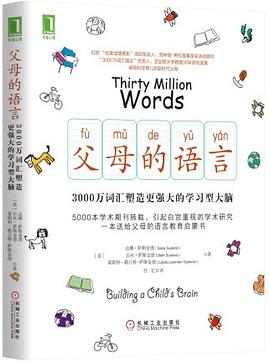WULOLIFE
《父母的语言:3000万词汇塑造更强大的学习型大脑》作者: [美]达娜·萨斯金德(Dana Suskind)出版社: 机械工业出版社
《父母的语言:3000万词汇塑造更强大的学习型大脑》作者: [美]达娜·萨斯金德(Dana Suskind)出版社: 机械工业出版社
Couldn't load pickup availability
Description
内容简介· · · · · ·
86%~98%
按照一年52周计算,在儿童4岁进入幼儿园小班之前,高知家庭和低收入家庭的孩子之间,就已经积累了高达3200万的词汇学习差异。在此基础上,低收1/2。
13~36 years ago
脑力劳动者家庭的孩子 487句话/小时
工人阶级家庭的孩子 301句话/小时
接收福利救济家庭的孩子 178句话/小时
3岁孩子累计听到的单词量
脑力劳动者家庭的孩子 4500万个单词
接收福利救济家庭的孩子 1300万个单词
相差3200万单词!
3岁孩子掌握的词汇量
脑力劳动者家庭的孩子 1116个单词
接收福利救济家庭的孩子 525个单词
相差591个单词!
700~1000 years of production父母的语言是刺激大脑发育的最好教育资源。3000万的词汇差距会极大影响儿童在数学概念、读写能力、自我管理、执行力, 批判性思维、情商、创造力和毅力等方面的表现。
到三年级时,孩子之间会产生显著的“成绩差距”或“学术落差”(achievement gap)。
越贵的并不一定是越好的,神经科学专家告诉我们,最好的教育是免费的,它就存在于父母的每一个词,每一句话,每一次交谈和每一份互动里。希望所有翻开这本书的父母,幸福的人生。
作者简介· · · · · ·
达娜·萨斯金德(Dana suskind)博士
芝加哥大学妇科及儿科教授,小儿人工耳蜗项目负责人,芝加哥大学医学院“3000万词汇倡议”机构的创始人和主任。这个机构的缘由是,基于科学研究表明,发育中的孩子早期接触的语言数量对其大脑构造和发展会产生非常不同的影响,这会直接影响到儿童的性格塑造及学习能力差异。
Too Small to Fail initiative”活动顾问,也是白宫“结束成绩差距”这一倡议的发起人之一,美国“Early Language Gaps: Sources And Solutions”白皮书的作者之一。本书是她30 。
